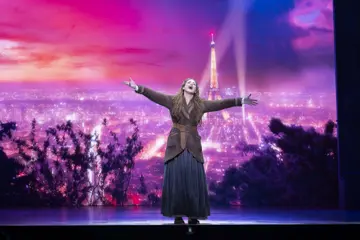French six-piece Moriarty took their name from Kerouac's beat picaresque novel, On The Road, quite appropriate for a band that “accidentally” found themselves suddenly touring internationally, playing some 600-plus shows since releasing their debut album, 2007's Gee Whiz But This Is A Lonesome Town. It took another four years to follow it up with 2011's The Missing Room, but harmonica player Thomas Puéchavy assures us that we won't be waiting quite so long for their third album.
“We've been recording with [Swiss three-piece] Mama Rosin these past three days,” he explains from the band's recording studio.
While on paper the line-up of primarily acoustic instruments at the core of Moriarty's music – xylophone, thumb piano, double bass and resonator guitars among others – looks pretty standard fare in these post-Fleet Foxes/Arcade Fire years, the way they record them makes Moriarty quite unique. Oddly enough, recording that sound had never really been a priority.
“We've been a band now for, what, 15 years or something, and we've always kind of made our own stuff, always kind of stuck together and try to play songs we like, create sounds and songs that we love. So yeah… unique, I don't know; but it's our own thing. We try to follow our own ideas and I guess the sound is a blend of different influences that every band member has. We don't really play a particular style of music – we just kind of do our own stuff. Sometimes it's fun, sometimes it's different, sometimes we don't know where we're going,” he chuckles.
Puéchavy admits Moriarty only really started discovering its own voice with the arrival of singer Rosemary Standley in 1999, four years after the band came together.
“Then there was a sense in what we were playing because of this incredible voice that was there. After that we lost our drummer so we became an acoustic band. At that moment we really thought about the sound we were making, the instruments we were using and what it meant. One of the important steps that made our sound different was the fact of going acoustic, losing the drums, losing the electricity.”
Don't miss a beat with our FREE daily newsletter
As for the fact that it took another eight years to get around to recording an album, “we were not really thinking about that. We were doing other things – some of us were students, some of us were working; we weren't trying to produce something that goes out in a commercial way. We were just playing music for ourselves, doing concerts once in a while and that was enough for us. Then one day somebody came up and said we should do a record and we thought, 'Why not? That's a great idea'.”
That debut album ended up selling some 70,000 copies around France and set off the gruelling but obviously enjoyable touring schedule that has enveloped Moriarty ever since. The unexpected success of Gee Whiz… however, prompted some re-evaluating of what Moriarty was about.
“After the first record, we kind of had the feeling that a part of our identity wasn't maybe being pursued. We had this song, Jimmy, [from Gee Whiz…] that had maybe a bluegrass kind of country feeling to it, and people identified with that song and what our sound should be, but that wasn't what we were about – it was just a song that came out in one moment in our lives. It was a great pleasure to know that the song was appreciated, but it was also a shock to think that our band would be only that.
“Then after playing 200 gigs, our sound evolved and I remember a tour in England where at one gig people were drinking beer and having fun and we had to play louder than they could talk. So we brought back a drummer for The Missing Room.”
Moriarty will be playing the following dates:
Saturday 9 March - WOMADelaide Festival, Adelaide SA
Wednesday 13 March - Upstairs Beresford, Sydney NSW
Thursday 14 March - The Famous Spiegeltent, Melbourne VIC
Saturday 16 March - The Hi-Fi, Brisbane QLD















